Pelvic Health Physical Therapy Level 1 Lab
Acronym: PH1 Lab
Overview
In this in-person course, Physical Therapists, Physical Therapist Assistants, and 2nd Year/3rd Year Student Physical Therapists* will apply the knowledge gained from PH1 Webinar. This course includes practical, hands-on lab activities such as external and internal vaginal examinations. You will engage in group work, alternating between the roles of clinician and patient in pairs or triads.
This course may be taken only after you have successfully completed and passed the PH1 Webinar course. Both courses must be completed and passed in order to complete Pelvic Health Level 1.
Course participants of all genders may be present in the room during the completion of examinations. Please see the Requirements regarding lab participation expectations and model instructions.
Topics
- Anatomy of the pelvic girdle
- Physiology of micturition
- Dysfunctions of the lower urinary tract
- Dysfunctions of the pelvic muscles
- Patient history examination
- Testing and treatment interventions for the patient with underactive pelvic floor muscle conditions.
- Urogynecologic surgeries
- Medication
- Prevention of pelvic floor dysfunction
Included
- 🕒 Contact hours toward CEUs
- 📓 Printed lab manual, 2D Diagram
- ✔️ Supervised lab activities
- 📑 Certificate of Completion
- 🥇Shareable Digital Badge
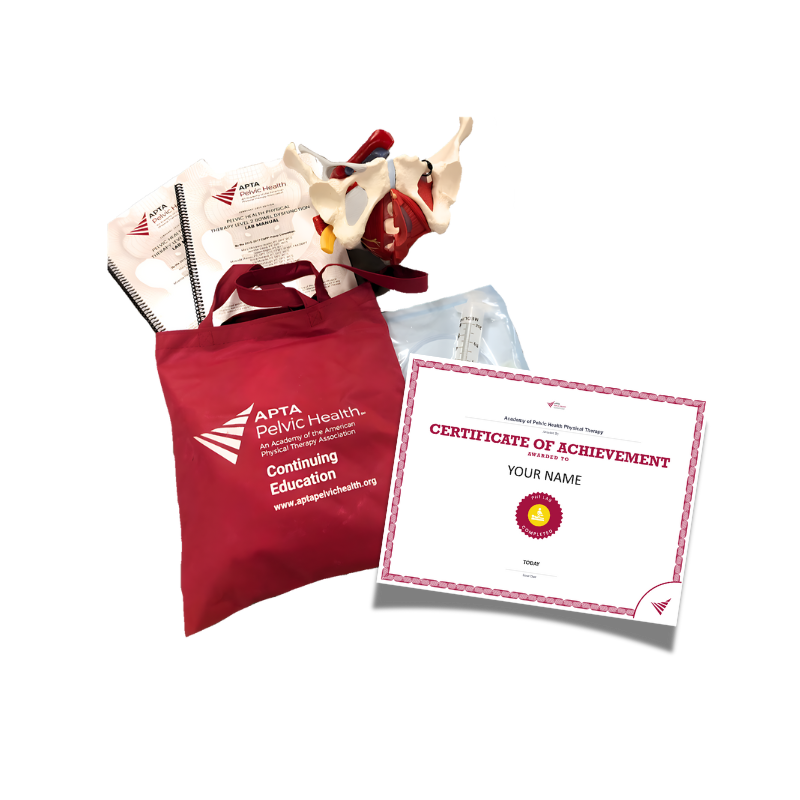
Certification Affiliation
This course must be completed after you have successfully completed and passed the PH1 Webinar course in order to complete the PH1 course level as a whole. This course is also affiliated with the Academy's Certificate of Advanced Practice in Physical Therapy in Pelvic Health (CAPP-Pelvic) Program. While the CAPP-Pelvic certification is optional to pursue, we encourage all eligible and are already actively taking CAPP-Pelvic affiliated courses to pursue it to earn the CAPP-Pelvic distinction.
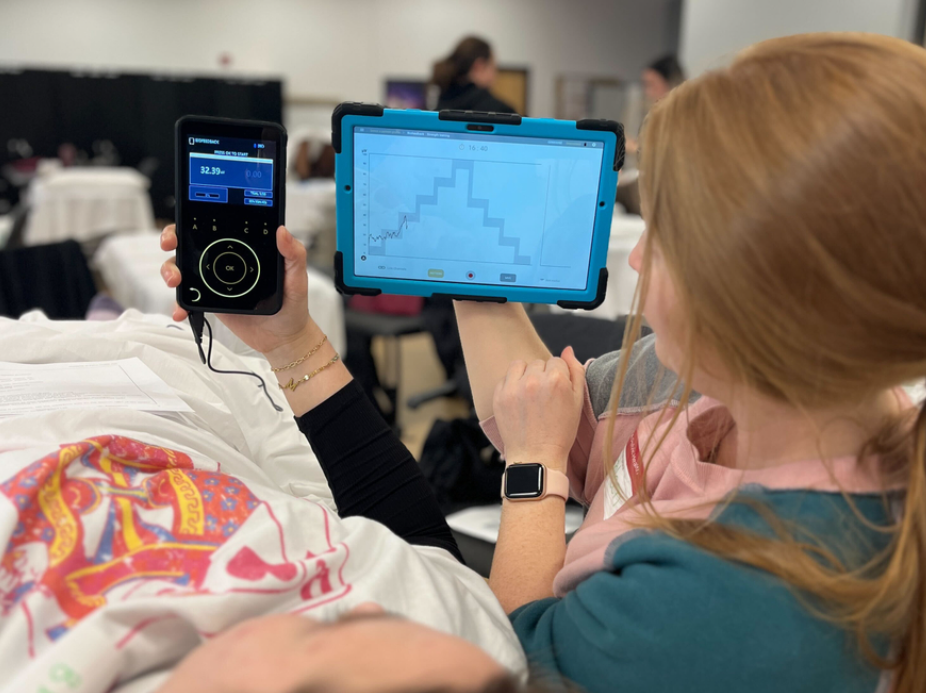
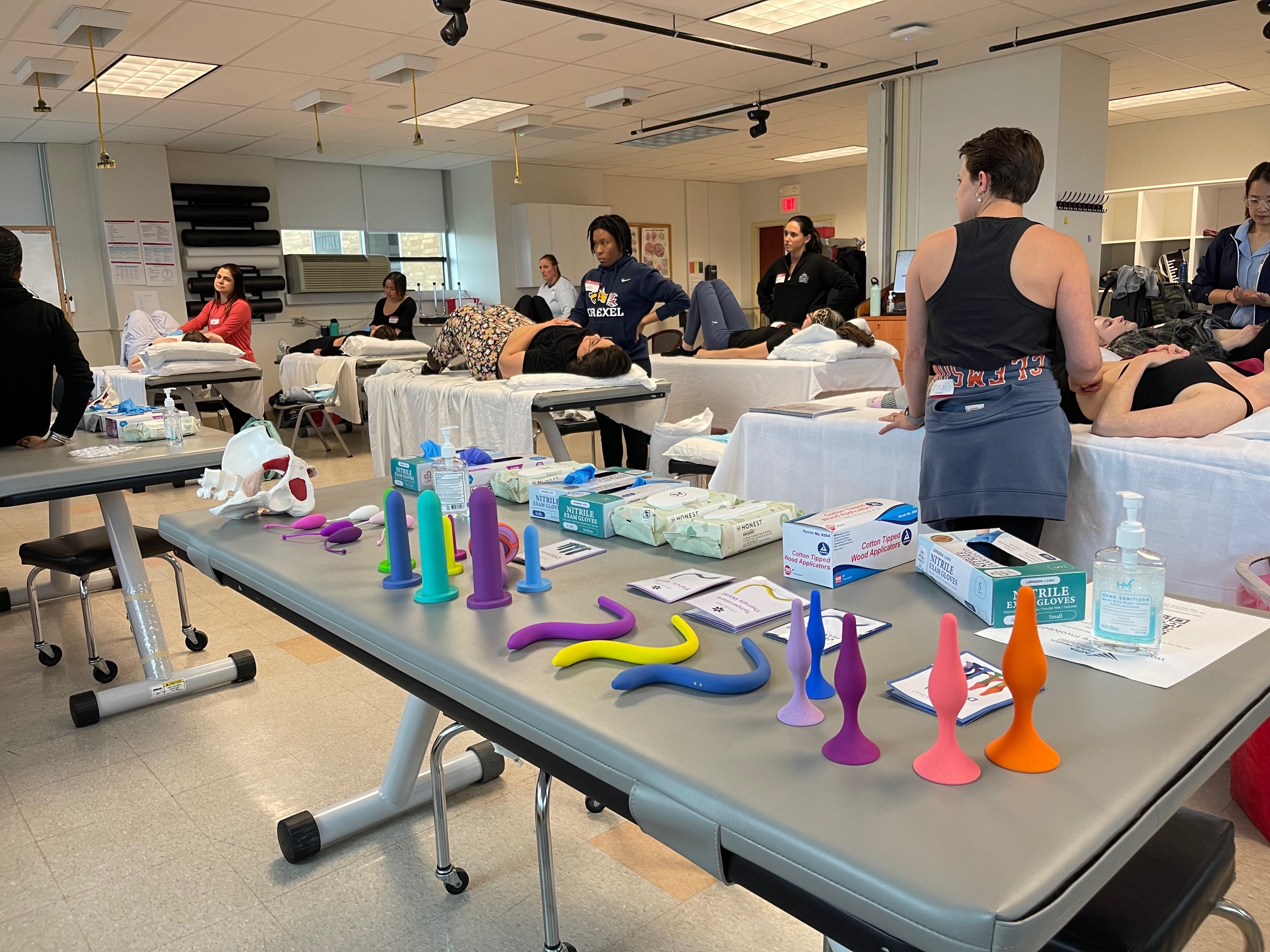
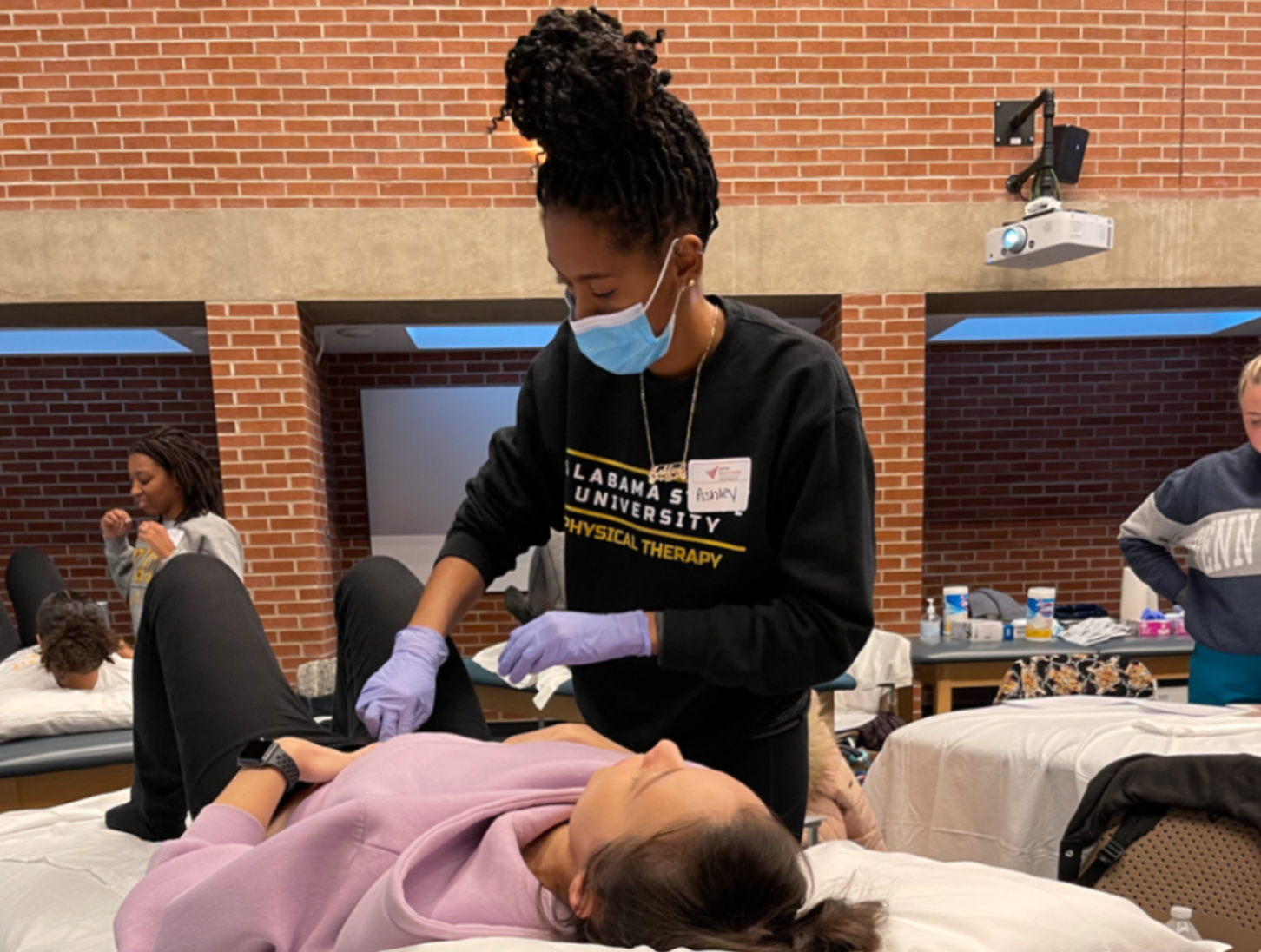
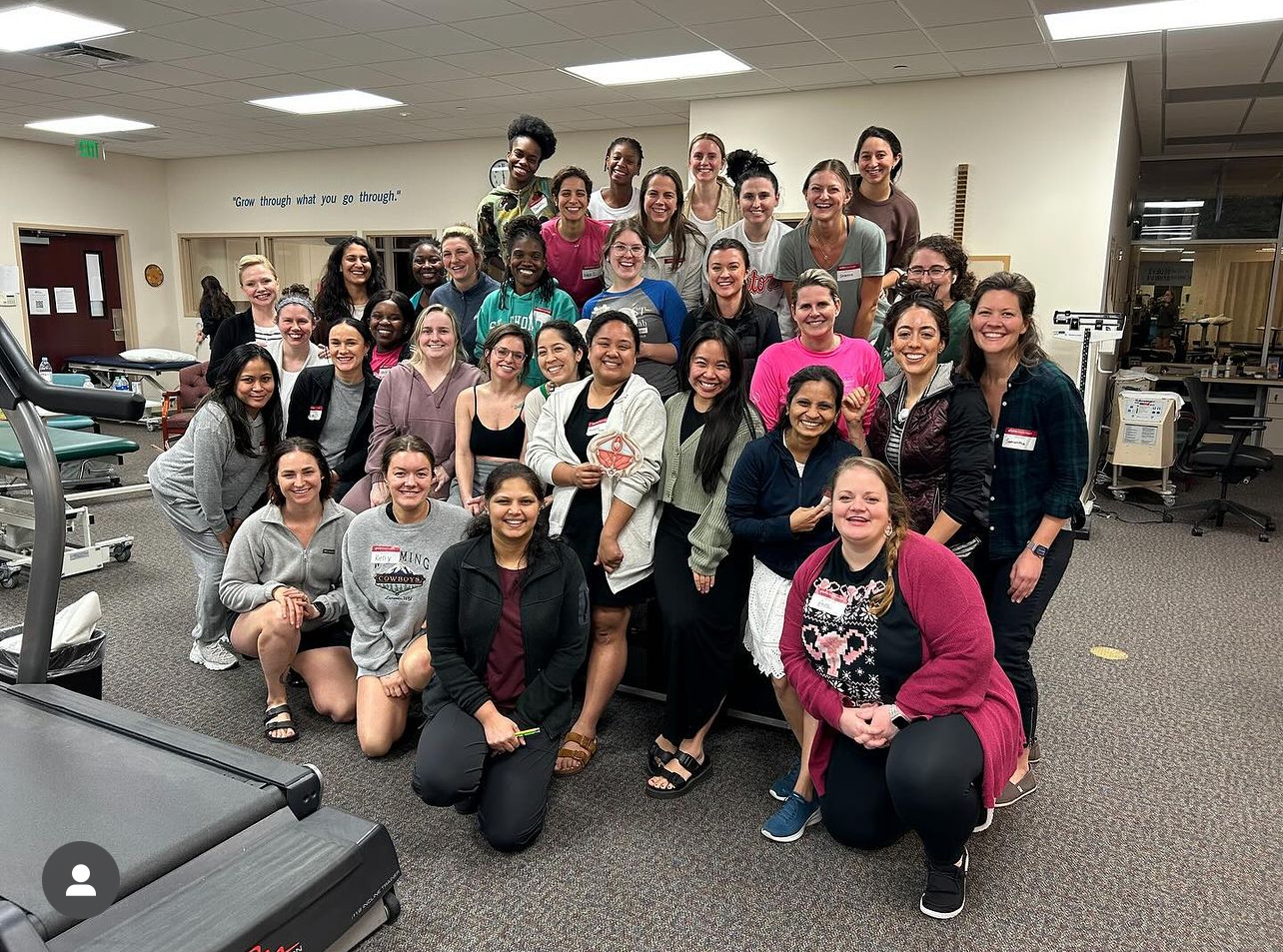
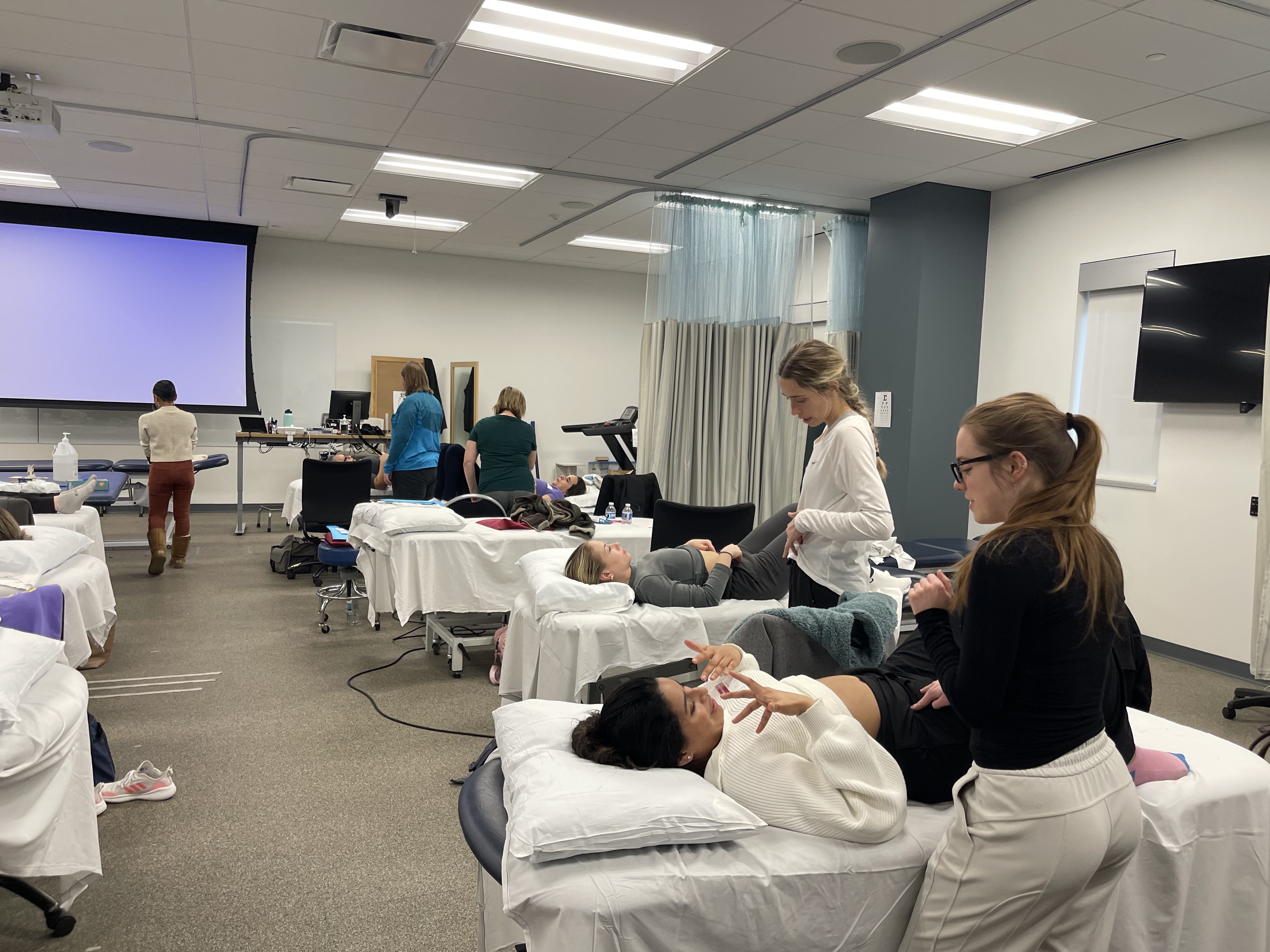

Learning Objectives
Upon completion of the 2-part course, participants will be able to:
Examination / Evaluation
- Identify and examine the anatomy of the pelvic girdle
- Describe the function of the lower urinary tract and female pelvic organs.
- Demonstrate proper infection control techniques involved in pelvic floor muscle examination.
- Perform an external evaluation of the female genitalia verbally identifying bones, ligaments,muscles and other structures.
- Perform an internal pelvic examination identifying muscles, ligaments, bony prominences with identification of pelvic floor muscle origins and insertions.
- Demonstrate proper technique in testing muscle strength of the levator ani muscles.
- Demonstrate proper technique in testing for pelvic organ prolapse.
- Demonstrate proper use of handheld EMG biofeedback to assess pelvic floor musculature.
Diagnosis / Prognosis
- Differentiate between under active pelvic floor muscles and overactive pelvic floor muscles.
- Demonstrate an understanding of bladder tests and measurements (bladder diary, urodynamic testing, pad testing, etc.) that are used in the process of differential diagnosis.
- Demonstrate the ability to compose a plan of care including functional goals, prognosis and length of care for the patient with under active pelvic floor conditions.
- Explain red flags related to treatment of the pelvic floor and understand when to refer to another healthcare provider.
- Understand urogynecologic surgeries and their effect on prognosis and pelvic floor muscle dysfunction.
- Demonstrate understanding of various medications and their effects on the bowel and bladder and identify how that may affect prognosis for a patient with pelvic floor muscle dysfunction.
Intervention
- Explain the effects of pelvic floor under activity and proper technique of pelvic muscle exercises for rehabilitative purposes.
- Explain the relationship between the abdominal muscles and the pelvic floor muscles as they relate to activities of daily living.
- Describe the various interventions available to strengthen the muscles of the patient with an under active pelvic floor and clinically reason when and why the various interventions might be used.
- Demonstrate proper use of a handheld pelvic floor muscle electrical stimulation unit and explain its appropriate uses for a patient with pelvic floor muscle dysfunction.
- Describe techniques that can be used to train (retrain) the bladder and when each intervention might be used.
Requirements
ELIGIBILITY REQUIREMENT
- Licensed Physical Therapist (PT)
- Licensed Physical Therapist Assistant (PTA)
- 2nd Year Physical Therapy Student (SPT)
- 3rd Year Physical Therapy Student (SPT)
- No other professional types are permitted for this course. No exceptions will be made
PREREQUISITES
- None.
- Successful completion of the PH1 Webinar
- We recommend students have some orthopedic and musculoskeletal coursework in their curriculum prior to attending the course.
LAB PARTICIPATION
The APTA Academy of Pelvic Health welcomes all SPTs, PTAs and PTs to participate in our courses regardless of gender identity, medical condition or pelvic anatomy. For all pelvic health labs, attendees are expected to be both the examining “therapist” and “patient” participant. If a participant has a pre-existing medical condition that prevents them from having an examination (see Medical Model Guidelines) or lacks the anatomical components examined for the specific lab, they are encouraged – but not required – to bring a medical model to serve as the ‘patient’ during labs. Bringing a model will provide the most hands-on experience, but alternative accommodations will be made for those who do not bring one. Accommodations may include participating in groups of three.
We do request that the participant fill out a form so that we are aware and can plan accommodations as needed.
- Report Medical Conditions | Please fill out this form only if you have medical conditions to disclose.
- Medical Model Form | Medical Model Guidelines
SPECIAL ACCOMMODATIONS
If you require special accommodations to fully participate in this upcoming course, please send us a message to discuss your needs and make necessary arrangements.
Please adhere to the medical model guidelines below when bringing in a medical model. The model must be present for all labs and skill checks. If you are bringing a medical model OR are opting out of participating as a ‘patient’ in internal labs for the following reasons, please fill out appropriate forms ASAP and inform the Academy office so that instructors are informed BEFORE the lab so that we can ensure any additional accommodations can be planned.
Medical Model Form | Medical Model Guidelines
CONDITIONS THAT MAY NECESSITATE USE OF A MODEL OR OPTING OUT OF INTERNAL PELVIC EXAM LAB PARTICIPATION AS A ‘PATIENT’
- A participant who is experiencing an active exacerbation of an abdominopelvic medical condition (e.g. inflammatory bowel disease) or dermatologic condition (e.g.. lichens sclerosis), that would prevent an exam:
- A participant with a history of sexual abuse or trauma
- The Academy is mindful of how participation as a “patient” in examinations might impact a participant who has a history of sexual abuse or trauma
- Some participants may experience an emotional response as the “patient”
- It is the participant’s decision to disclose any history to the instructor as necessary; any information shared remains confidential
- A participant that currently has or history of pelvic pain or painful sexual activity
- Some participants may experience physical discomfort and/or an emotional response
- If you have a history of pelvic pain or painful sexual activity but choose to
participate as the “patient” in labs, you may choose to disclose the current
or history of pelvic pain to the faculty
- Confirmed or suspected pregnancy
- You must submit a signed medical release from your medical provider that
allows you to participate in all examinations
- You must submit a signed medical release from your medical provider that
- A participant who has never had an internal gynecological examination
- Social, cultural, or religious practices
CONDITIONS THAT REQUIRE USE OF A MEDICAL MODEL OR OPTING OUT OF INTERNAL PELVIC EXAM LAB PARTICIPATION AS A 'PATIENT'
- Recent surgical procedure without medical clearance
- Less than six (6) weeks postpartum
- Active urinary tract, vaginal, or rectal infections
- Active lesions from sexually transmitted infections
- Indwelling catheter
- The participant lacks the anatomical components for examination
THE FOLLOWING CONDITION DOES NOT REQUIRE A MEDICAL MODEL
-
Participants who are actively menstruating
-
A menstrual disc, if desired, will be provided to participants to enable internal vaginal examinations
-
FILL OUT THIS FORM BEFORE THE LAB IF YOU INTEND TO BRING A MEDICAL MODEL OR OPTING OUT AS ‘PATIENT’ FOR THE LAB
If a participant chooses to use a medical model OR are planning to opt out of being a ‘patient’ based on the reasons listed above, you MUST inform the Academy office at hello@aptapelvichealth.org or using the attached form that a model will be used OR you are opting out and reason.
Lab Participation / Medical Disclosure Form
WHAT TO BRING
- Comfortable, loose-fitting clothing that is comfortable for you to move in during the lab activities (some attendees bring a sweater or pullover as temperatures in the auditoriums and classrooms can often fluctuate)
- Laptop and charger (if you wish to take notes electronically; printed lab manuals will be provided by the Academy)
- Snacks and refreshments (the Academy provides some light refreshments but you are welcome to bring your own as well)
- Pencils and/or pens (useful for lab activities and worksheet activities)
- Hair ties (if you have long hair, we recommend for you to tie it in a ponytail during the lab activities)
- Nail filer (due to the physical interaction between attendees, we recommend for you to file your nails prior to lab activities)
WHAT ELSE YOU SHOULD KNOW
- You must complete the PH1 Webinar before advancing to PH2 Bowel Dysfunction Webinar and PH2 Pelvic Pain Webinar. You may complete both labs (PH1 Lab and PH2 Lab) in one weekend.
- We recommend students have some orthopedic and musculoskeletal coursework in their curriculum prior to attending the course.
- Course participants of all genders may be present in the room during the completion of examinations.
- Appropriate draping and positioning will be performed; however, visual assessment and palpation of external and internal anatomy are required for safe examination practice.
- External and internal examinations performed in the course pose a no greater risk than a standard gynecologic or colorectal examination.
ATTENDANCE REQUIREMENT
Attendees must be present throughout the duration of the course. Contact hours will be forfeited and the attendee will be dismissed if the attendee:
- Misses two (2) or more lecture hours
- Misses any part of the Case Study Presentation and related group activities
To advance to the next course level, the attendee who missed the above will have to retake the course at her/his/their own expense.
Should extenuating circumstances arise, it is the responsibility of the participant to notify a course faculty member of the need to leave. Consideration for course completion will be made on a case-by-case basis.
CEU APPROVAL
Unless otherwise noted in the course description, the Academy of Pelvic Health Physical Therapy does not independently seek approval for course Continuing Education Unit (CEU) numbers in each state. It is the responsibility of each participant to submit their own CEU applications within their respective states. We are committed to assisting you in obtaining and supplying any required documentation for your CEU application. Historically, our course participants have consistently encountered no difficulties in securing approval for continuing education credits (CEUs) upon submission to their state's board.
Testimonials
"Thought the lab was great, learned a lot and thought all the skills reviewed were nicely integrated from the info taught during the webinars.”
"I loved that the physical exam was proctored. I felt more confident as a result. I felt that the whole lab was designed well in that it set participants up for success."
"It was very helpful for me to have pelvic models available to correlate what I was palpating to what I could see on the model."
"Lab was great – I learned a lot and felt that I was able to apply the information taught in the webinar nicely. All instructors were excellent – really helpful with any questions. Will definitely recommend it to others!"
"Content was amazing, exceeded my expectations. I have also previously taken a level 1 course through another company but I felt the Academy's level 1 was much more comprehensive and detailed."
“Lab was great – I learned a lot and felt that I was able to apply the information taught in the webinar nicely. All instructors were excellent – really helpful with any questions.”
“It was a lot of information to put into 1 day. However, I did like that the didactic portion and lab portions were separate – I felt I could learn more during the didactic portion, then review before the lab.”
“Loved it, even with the uncomfortable moments. Presenters were great. Information was great. Will definitely recommend it to others!”
“This lab was well structured with a good amount of content. I very much appreciated the pace and time allowed during the proctored labs. It was very helpful for me to have pelvic models available to correlate what I was palpating to what I could see on the model.”
“I loved that the physical exam was proctored. I felt more confident as a result. I felt that the whole lab was designed well in that it set participants up for success.”
“Thought the lab was great, learned a lot, and thought all the skills reviewed were nicely integrated from the info taught during the webinars.”
"Very helpful, great presentation of material. Great instructors. Super friendly and helpful!"
"Lab evaluation was incredibly helpful and assisted with recall in a non-stressful environment promoting improved clinical skills."
"I found it to be well-organized, helpful, and thorough! The course was excellent in prepping and building confidence to work with pelvic floor patients. The instructors were great!! Amazing guidance provided by all of them."
"The lab set up and course was great! I retook the course because it's been 10 years since I took the first one and I feel I still was learning something new. With these courses I always feel like I'm getting the latest research information. The instructors are so nice, helpful, and knowledgeable."
"I appreciate the structure and time management of the course. I appreciate the friendly, safe learning environment fostered by the classmates, instructors, and assistants. I appreciate the tips and chaperone of the instructors and answered my questions as this was a lot of first time experiences for me."
"This course helped me hone my skills and all instructors were really good and ensured we had one on one attention and answered all of our questions. Everything was well organized. Everyone made me feel comfortable and confident with my abilities."
"I thoroughly enjoyed the course content and presentation. The instructors provided valuable feedback and were very insightful and resourceful with any questions. I would absolutely recommend this course to someone else.
Thank you for the instructor guided labs. It's was so helpful to be able to be talked through internal examination as a group and worked well for my learning style. Great course! I really appreciated how you encouraged us to switch partners and it was overall a great learning experience."
"This course was excellent. I was very nervous coming into it, but the instructors were very helpful and reassuring. I feel confident about my skills and knowledge after completing this course, and I look forward to completing the rest of the labs."
"Overall, I thought this course ran very smoothly and efficiently. The instructor and TAs were very attentive and helpful. They also demonstrated themselves very professionally while also demonstrating the importance of the subject matter.
I really like the layout of these courses as well as the above average amount of practice time and hands on experience and feedback.
I thoroughly enjoyed the lab! I was very nervous coming in since it was something I have never done before, but the atmosphere was amazing. The content was easy to follow and learn. The lab was set up in a way that I got professional direction and then time to practice the way I preferred to. It was all around an amazing class.
It was well organized and thorough! I have such a better understanding of the anatomy now. This course was very beneficial and well run.
"This course was very informative and I felt that I was able to gain a better understanding of the skills for examination.
"This course was amazing and exceeded my expectations. The content of the course is something that most people have never done before and the schedule of events was designed nicely to ease everyone into it."
I felt the course was very well organized. The short lecture portions before the labs were beneficial to prepare us for what we were going to be doing. I also felt every question I had was answered by the faculty in the room! They were always available to help or answer questions.
"I really enjoyed the PH1 lab course. The webinar prepared us very well for lab and it was really great to go directly into lab rather than sit through lecture for 2 hours in between each section. I thought the course was extremely well organized. It was clear with assessment and interventions and I have taken away so many clinical pearls from the weekend. I really liked the proctored lab time and the exam. I appreciated all of the feedback and excited to implement it into practice."
"This course was very organized and I felt I learned a lot. I feel confident in my skills after this lab going into the clinic and upcoming clinical."
"The course was very well put together and presented. Everything was explained/reviewed prior to class execution with step by step proctoring during training. Our presenter was very knowledgeable and had a great way of presenting the material and guiding us through the lab. This was a helpful introduction to pelvic health. The video modules provided pre-course will be a good reference to save."
"The course was great! I learned a lot and felt like I had a lot of opportunities to practice new skills in lab, and ask questions at anytime if I needed help."
"I liked how many lab assistants were available and no one made you feel dumb when you asked questions."
"I had no idea what to expect from this course and was extremely nervous going into it but this blew my expectations out of the water. Everyone was so friendly and professional and just wanted everyone to succeed. I really appreciated that help was there when I needed it and the pace of learning could be adjusted because there was a couple times when I got behind but was able to quickly get caught up."
"Loved how comfortable everything felt and how reassuring the educators were. Instructors were very knowledgeable and helpful as far as sharing personal experiences to improve our knowledge."
"I felt this course was very informational and I am so happy I took it."
"The course was very insightful! The content was organized in a way that was understandable and easy to follow. I also enjoyed that after every lecture series there was lab time afterward to practice the material just learned which was great for me who is a visual learner."
"Initially it was difficult to 'wrap my mind' around being the patient but I decided not to get a medical model because I need to appreciate what my patient's will feel so I can be more conscious about how I deliver care psychosocial as well as achieve my professional objective. This course delivered on all of that. Thank you ladies for being very supportive of us all and thank you to the course attendees for being in tune and supportive as well."
"Well-organized course and content. Instructor and TAs are very knowledgeable and experienced. Amazing and very valuable course!"
"I appreciate the calming humor you all brought to the course. Non-judgmental zone with encouraging environment. Can't wait to continue with APTA courses in pelvic health."
"Very professionally-run course, very engaging, and the instructors normalized the components most of us were apprehensive about.
Schedule
Already registered? Access your course materials!
Access the Learning Center
Helpful Links- Lab Preparation Tips
- Frequently Asked Questions
- Event Registration Terms & Conditions
- Privacy Policy
- Sponsors & Advertisers
- Cancel My Registration or Transfer to Another Course
- Request a Past Course Certificate
- Sign Up for New Course Email Alerts
Lab Participation
Please watch these helpful videos to prepare yourself for the lab course.
Lab Expectations
Using a Medical Model in Lab
Self-Care During Lab
How Lab Works
CAPP-Pelvic Certification Pathway
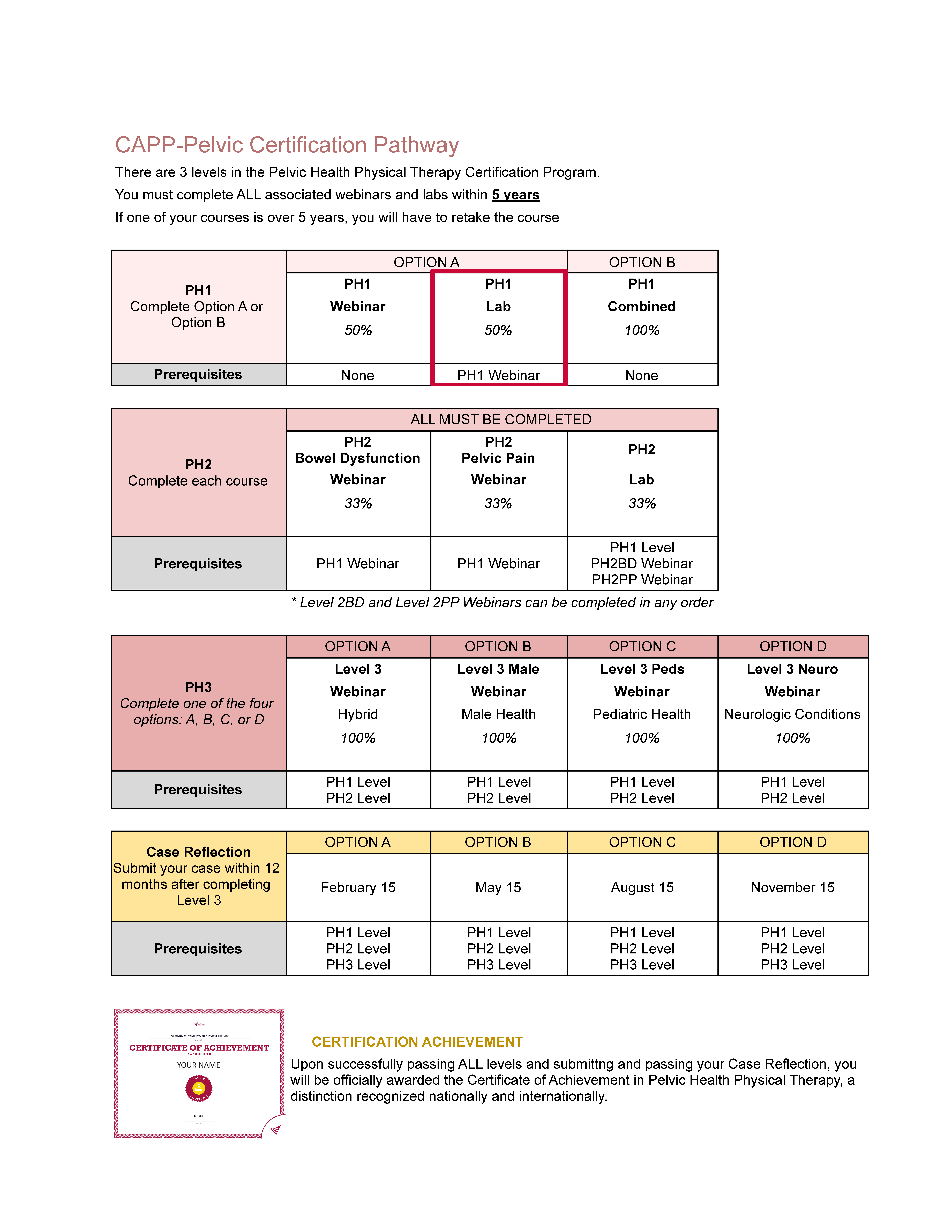
Pricing
Please note that early-bird rates expire 30 days prior to the scheduled course. Want to qualify for member pricing? Join the Academy today!
| Type | Early-Bird | Regular |
|---|---|---|
| PT Member | $315 | $340 |
| PTA Member | $243 | $268 |
| SPT Member | $243 | $268 |
| Non-Member | $360 | $385 |
Helpful Links
- Discount Promotions
- Scholarship Opportunities
- Employer Justification Letter Template
- Registration Cancellation Policy


